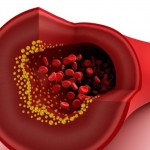Got Calcium—In Your Heart?

When the subject of calcium comes up in a conversation about health, it’s usually spoken of in a positive light. Dietary calcium is good for you. It strengthens your bones, enables your heart, muscles and nerves to function well, and may even prevent certain diseases.
But what if, instead of the word, calcium, I use the word calcification? Huh. Now that’s when the conversation begins to sound more ominous.
When a soft tissue structure in the body becomes “calcified,” it loses its pliability and contractibility. Such is the case with calcification in the coronary (heart) arteries. Now these calcified arteries are NOT the result of too much dietary calcium, but rather the result of the individual cells within the heart not functioning properly.
A fairly new heart test which you may benefit from—but may never have heard of—has been developed in the world of cardiovascular science. It’s called a coronary artery calcium (CAC) scan from which a calcium score can be obtained.
One of my patients, and a couple of my friends, have recently had this coronary scan done. They tell me the test takes about 10 minutes to perform. The cost is between $75-$100, out-of-pocket, as most insurance companies are not covering this test at the present time due to the newness of it.
So, why might you consider such an out-of-pocket expense? Because in a research study done at Johns Hopkins and published in 2013 in the European Heart Journal, CAC scan results presented a much better estimate of future heart disease risk than the traditional risk factors alone did (smoking, cholesterol levels, high blood pressure and diabetes)—especially when assessing those at both ends of the risk spectrum: very low risk and high risk.
In fact, fifteen percent of those thought to be at very low risk (given their other risk factors) actually had HIGH CAC scores and 35% of those considered to be high risk actually had NO calcium in the coronary arteries!
Knowing your calcium score (O-300+*) will guide your cardiologist (or primary care physician) to the best intervention and timing of treatment in YOUR particular case, not in general, given your other associated risk factors.
I don’t know about you, but I think this information is $100 worth sending!
*Calcium Scoring:
0 = no plaque detected (risk of coronary artery disease is very low – less than 5%)
1-10 = calcium detected in extremely minimal levels (risk of coronary diseases is still low – less than 10%)
11-100 = mild levels of plaque detected with certainty (minimal narrowing of heart arteries is likely)
101-300 = moderate levels of plaque detected (relatively high risk of a heart attack within 3-5 years)
300-400 = extensive levels of plaque detected (very high risk of heart attack, high levels of vascular disease are present)